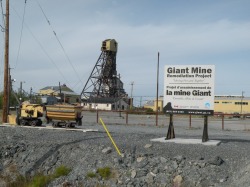Aboriginal Studies Seminar

Historian John Sandlos will present a talk on the role of history, memory and traditional ecological knowledge during the recent Giant Mine Remediation Environmental Assessment, Friday January 30th, 1-2:15, SN (4087). The paper, co-authored with Geography Professory Arn Keeling, is titled, "Aboriginal Communities, Traditional Knowledge, and the Environmental Legacies of Extractive Development in Canada."
In northern Canada Aboriginal traditional knowledge (TK) has in the last 40 years been formally incorporated into state-driven wildlife management and in some cases approval processes for industrial projects. Yet, as the environmental legacies of northern development proliferate, questions remain about how successfully Aboriginal TK has been included in and applied to issues of remediation, reclamation and restoration at former industrial sites. This paper will focus in the high profile case of the Canadian government’s attempt to remediate arsenic contamination at the former Giant Mine. This abandoned mine contains 237,000 tons of this toxic material stored underground adjacent to Yellowknife and the Dene communities of Dettah and Ndilo. While the Giant Mine Remediation Project has indicated a desire to incorporate traditional knowledge into the reclamation project, the complex technical nature of the process, and a fundamental misunderstanding about the epistemological basis of Aboriginal TK, has prevented anything more than token inclusion of such knowledge. Using transcripts from the recent environmental assessment of the project, we argue that proponents of remediation projects fail to acknowledge that Aboriginal TK is not simply a storehouse of scientific data on plants and animals, but is woven together with historical memories of rapid social, economic and environmental changes associated with northern development projects.